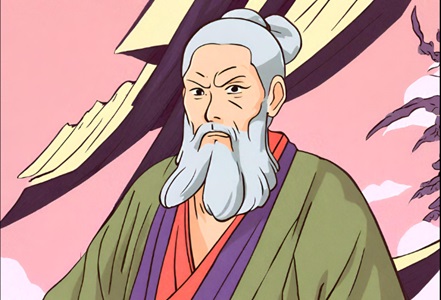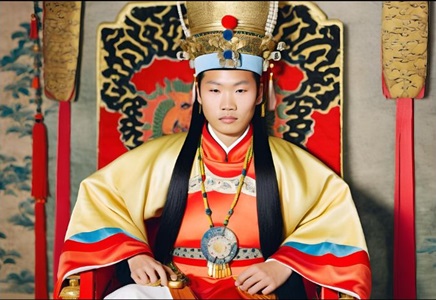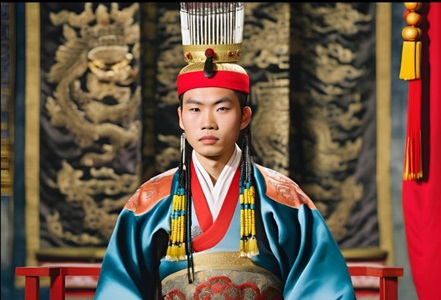Title of Biography in Chinese, Pinyin: 孙武传 (Sūnwǔ Zhuàn).
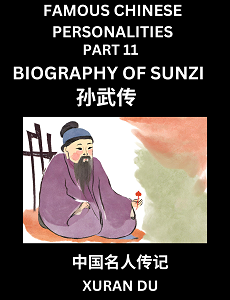
Title of Biography in English: The Biography of Sun Zi/Sun Wu.
Check out books on my Amazon and Barnes & Noble homepages as well as the following pages to learn Biographies of famous Chinese personalities-
- Part 2 – Chinese Biography Book Series for Beginners
- Part 1 – Chinese Biography Book Series for Beginners
- Part 3 – Chinese Biography Book Series for Beginners
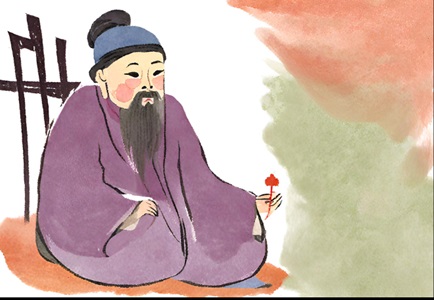
The Biography of Sun Zi in English (英文传记)
Sun Wu: The Legendary Life of the Ancestor of Military Strategy

Sun Wu, also known as Chang Qing, was a renowned military strategist and thinker during the Spring and Autumn Period. He is widely regarded as the “Saint of War” due to his outstanding contributions to military strategy.
Born into a military family, Sun Wu displayed a keen interest and aptitude for military arts from a young age. He served the State of Wu and assisted King Helu in reforming the military and enhancing its combat capabilities. Under Sun Wu’s guidance, the State of Wu flourished and gradually emerged as a prominent power among the feudal states.
Sun Wu’s masterpiece, The Art of War, systematically expounds the fundamental principles, strategies, and tactics of warfare. His classic statements such as “Know your enemy and know yourself, and you can fight a hundred battles with no danger of defeat” and “War is a matter of vital importance to the state; it is a domain of life and death, a road to survival or ruin. Hence, it is a subject of inquiry which can never be ignored” have remained widely influential and are still relevant in military, political, and business fields.
Sun Wu’s military thought emphasized victory through wisdom and emphasized the use of psychological tactics and strategies. He advocated unity of purpose among the upper and lower ranks and clear distinctions in rewards and punishments to enhance the cohesion and combat effectiveness of the army. On the battlefield, Sun Wu excelled in utilizing natural conditions such as terrain and weather to devise ingenious tactics and bring the enemy into difficult situations.
Beyond his military talents, Sun Wu also possessed noble character and outstanding political wisdom. Deeply aware of the cruelty of war, he advocated caution in waging war and preferred resolving disputes through peaceful means. At the same time, he was concerned about the people’s livelihood and advocated enriching the country and strengthening its military to achieve long-term stability and prosperity.

Sun Wu’s legendary life and profound military thought have exerted a far-reaching influence on later generations. He is revered as the “Ancestor of Military Strategy” and serves as a model and inspiration for military scholars worldwide.
Learn Biography Of Sun Zi in Chinese (中文传记)
孙武,字长卿,春秋时期著名的军事家、战略家,被誉为“兵圣”。他的一生充满了传奇色彩,不仅在战场上屡建奇功,还著有兵家经典之作《孙子兵法》,对中国乃至世界的军事学发展产生了深远影响。
孙武出身于军事世家,自幼聪颖好学,精通兵法战略。他曾在吴国效力,协助吴王阖闾(hé lǘ)进行军事改革,提高军队战斗力。在孙武的辅佐下,吴国国力日盛,逐渐在诸侯国中崭露头角。

《孙子兵法》是孙武的代表作,该书系统地阐述了战争的基本原则、战略战术以及治军之道。书中提出的“知己知彼,百战不殆”、“兵者,国之大事,死生之地,存亡之道,不可不察也”等经典论断,至今仍被广泛应用于军事、政治、商业等领域。
孙武的军事思想强调以智取胜,注重运用心理战术和谋略。他主张“上下同欲”、“赏罚分明”,以提高军队的凝聚力和战斗力。在战场上,孙武善于运用地形、天气等自然条件,制定巧妙的战术,使敌人陷入困境。
除了军事才能外,孙武还具备高尚的品德和卓越的政治智慧。他深知战争的残酷性,因此主张慎重对待战争,尽可能通过和平手段解决争端。同时,他也关注民生,提倡富国强兵,以实现国家的长治久安。
孙武的一生充满了传奇色彩,他的军事思想和战略战术对后世产生了深远的影响。他被誉为“兵圣”,成为军事学界的楷模和典范。
Sun Zi Biography Keywords- English, Chinese & Pinyin (关键词)

- 孙武(Sūnwǔ, Sun Wu): A renowned military strategist and the author of The Art of War during the Spring and Autumn Period.
- 兵圣(Saint of War): A title given to Sun Wu in recognition of his outstanding contributions to military strategy.
- 孙子兵法(The Art of War): A classic military treatise written by Sun Wu, outlining the principles, strategies, and tactics of warfare.
- 兵法之祖(Ancestor of Military Strategy): A title referring to Sun Wu’s pioneering role and significant influence in the development of military strategy.
Pinyin of Sun Wu Biography (孙武传记的拼音)
Sūnwǔ, zì cháng qīng, chūnqiū shíqí zhùmíng de jūnshìjiā, zhànlüè jiā, bèi yù wèi “bīng shèng”. Tā de yīshēng chōngmǎnle chuánqí sècǎi, bùjǐn zài zhànchǎng shàng lǚ jiàn qí gōng, háizhe yǒu bīngjiā jīngdiǎn zhī zuò “sūnzi bīngfǎ”, duì zhōngguó nǎizhì shìjiè de jūnshì xué fāzhǎn chǎnshēngle shēnyuǎn yǐngxiǎng.

Sūnwǔ chūshēn yú jūnshì shì jiā, zì yòu cōngyǐng hàoxué, jīngtōng bīngfǎ zhànlüè. Tā céng zài wú guó xiàolì, xiézhù wú wáng hé lǘ (hé lǘ) jìnxíng jūnshì gǎigé, tígāo jūnduì zhàndòulì. Zài sūnwǔ de fǔzuǒ xià, wú guó guólì rì shèng, zhújiàn zài zhūhóu guó zhōng zhǎnlùtóujiǎo.
“Sūnzi bīngfǎ” shì sūnwǔ de dàibiǎozuò, gāi shū xìtǒng de chǎnshùle zhànzhēng de jīběn yuánzé, zhànlüè zhànshù yǐjí zhì jūn zhī dào. Shū zhōng tíchū de “zhījǐzhībǐ, bǎizhànbùdài”,“bīng zhě, guózhī dàshì, sǐshēng zhī dì, cúnwáng zhī dào, bùkě bù chá yě” děng jīngdiǎn lùnduàn, zhìjīn réng bèi guǎngfàn yìngyòng yú jūnshì, zhèngzhì, shāngyè děng lǐngyù.
Sūnwǔ de jūnshì sīxiǎng qiángdiào yǐ zhì qǔshèng, zhùzhòng yùnyòng xīnlǐ zhànshù hé móulüè. Tā zhǔzhāng “shàngxià tóng yù”,“shǎngfá fēnmíng”, yǐ tígāo jūnduì de níngjùlì hé zhàndòulì. Zài zhànchǎng shàng, sūnwǔ shànyú yùnyòng dìxíng, tiānqì děng zìrán tiáojiàn, zhìdìng qiǎomiào de zhànshù, shǐ dírén xiànrù kùnjìng.
Chúle jūnshì cáinéng wài, sūnwǔ hái jùbèi gāoshàng de pǐndé hé zhuóyuè de zhèngzhì zhìhuì. Tā shēn zhī zhànzhēng de cánkù xìng, yīncǐ zhǔzhāng shènzhòng duìdài zhànzhēng, jǐn kěnéng tōngguò hépíng shǒuduàn jiějué zhēngduān. Tóngshí, tā yě guānzhù mínshēng, tíchàng fùguó qiáng bīng, yǐ shíxiàn guójiā de chángzhìjiǔ’ān.

Sūnwǔ de yīshēng chōngmǎnle chuánqí sècǎi, tā de jūnshì sīxiǎng hé zhànlüè zhànshù duì hòushì chǎnshēngle shēnyuǎn de yǐngxiǎng. Tā bèi yù wèi “bīng shèng”, chéngwéi jūnshì xuéjiè de kǎimó hé diǎnfàn.
